This blog was written by Tanja Kisslinger, Advocacy and Communications Technical Advisor at Veterinarians Without Borders/Vétérinaires Sans Frontières (VWB/VSF) in reflection of a trip taken to Cambodia in February 2024 to document our AGROW program.
In the heart of rural Cambodia, amidst the tranquil landscape of Battambang province, a quiet revolution is unfolding. Women like Chek Chob, Chhun Ly, and Nhin Nika are rewriting the narrative of rural livelihoods, harnessing the power of cricket farming to secure brighter futures for themselves and their families. Their stories are a testament to their resilience and the transformative impact of AGROW.
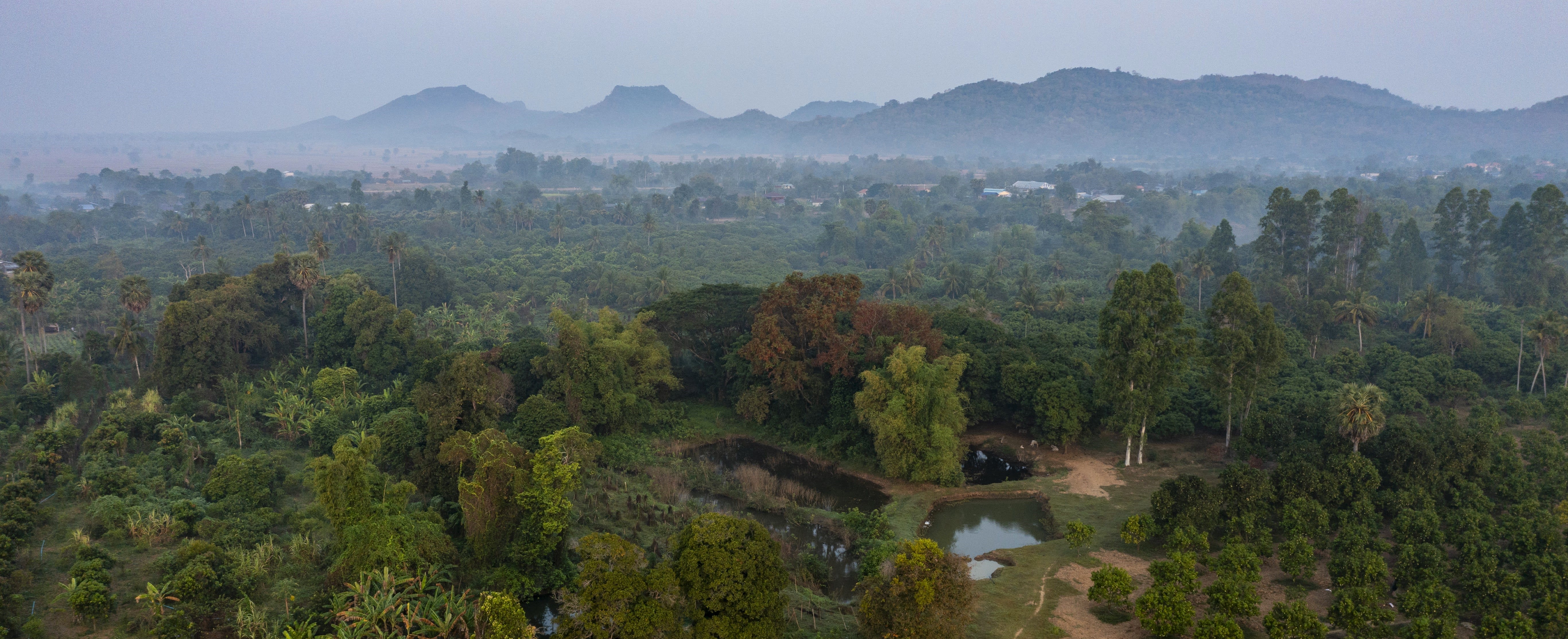
PHOTO: The rural countryside of Cambodia's Battambang province, where AGROW is supporting women in 48 villages across 3 districts.
According to World Bank statistics, nearly 80% of Cambodia's population resides in rural areas, where 65% rely on agriculture and livestock for their livelihoods. However, the farming sector faces significant challenges in technology, knowledge, and skill, hindering production and potential. Moreover, women in these rural communities face limited opportunities for income generation and lack access to education and training. In response to these challenges, AGROW, a 3-year "One Health" initiative, is equipping women with the tools and knowledge they need to thrive in cricket, chicken, and cattle farming as well as vegetable production.
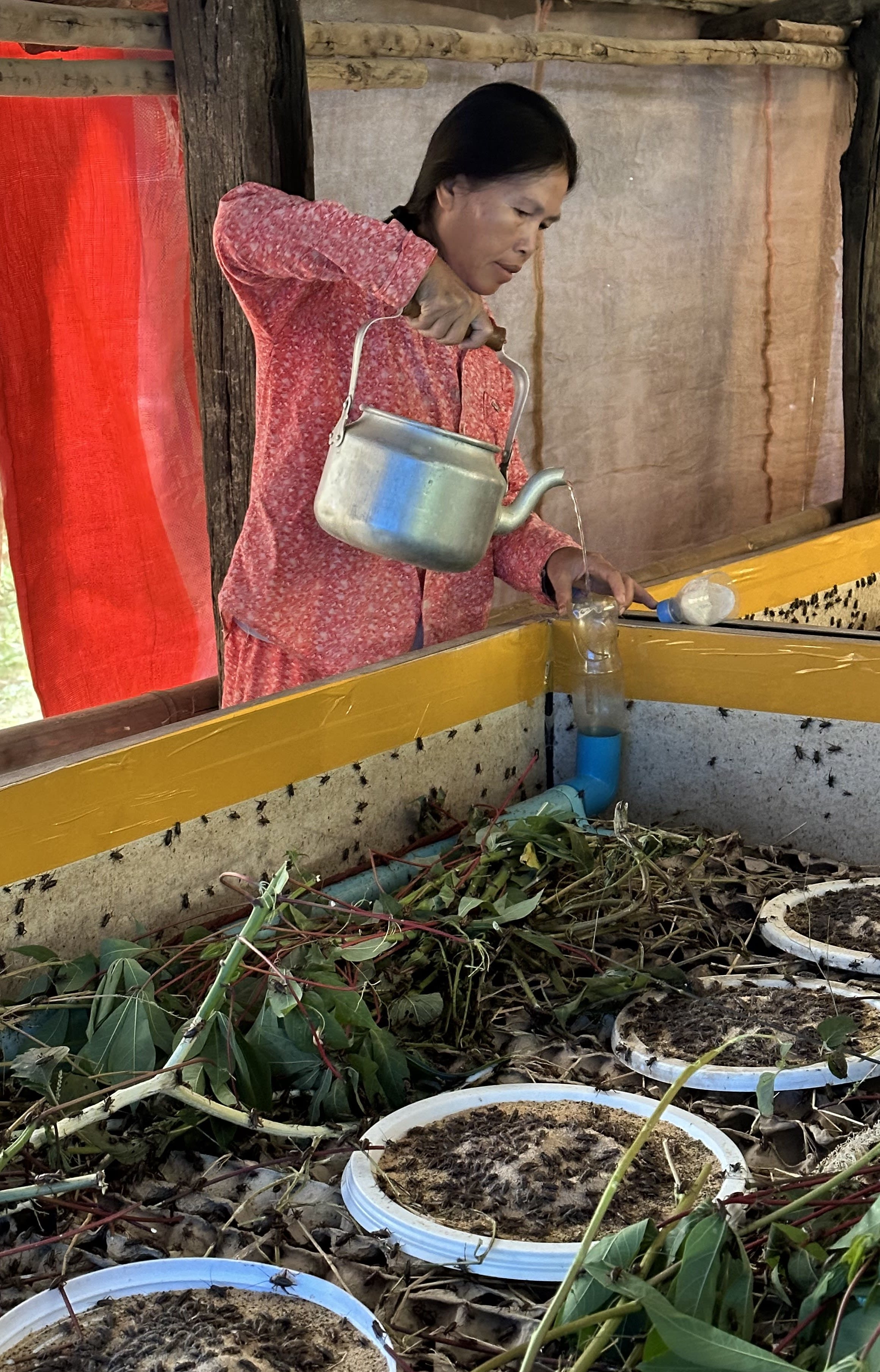 In particular, cricket farming is an innovative and effective way for women in rural Cambodia to enhance their economic security and nutritional well-being for several reasons:
In particular, cricket farming is an innovative and effective way for women in rural Cambodia to enhance their economic security and nutritional well-being for several reasons:
- Economic empowerment: Cricket farming offers women an entrepreneurial opportunity to rear protein-rich insects for local consumption and commercial sale, thereby breaking the cycle of poverty and dependency perpetuated by subsistence farming and low-paying jobs.
- Sustainable income: Unlike traditional agriculture, cricket farming requires minimal inputs and offers women who have few resources (e.g., land, water, chemicals) a means to earn sustainable income by selling crickets to local markets or even exporting them.
- Climate resilience: Amidst climate change and environmental degradation, traditional agriculture is increasingly unsustainable, while cricket farming offers resilient nutrition in shifting climates. These hardy insects are well-adapted to fluctuating temperatures.
- Gender normative change: Perhaps most importantly, women's participation in cricket farming challenges entrenched gender norms and traditional roles, showcasing women's capability beyond domesticity and inspiring change.
To date, AGROW has successfully trained 89 women in cricket farming across Battambang province, creating a positive ripple effect on 13,536 community members. In addition to training in cricket health and nutrition, women learn about One Health and gender equity - making the connection between animal, human and environmental health, and the importance of sharing household workloads.
Women are also provided with a "starter kit", consisting of cricket eggs, cricket basins, trays, nests, chicken feed, and "biochar" (i.e., a moisture-absorbing substrate for crickets to lay eggs on). Before their first harvest, they use the maturing crickets' eggs to re-populate the nests. In this way, as crickets are harvested (every 45 days or so), there are new crickets being hatched and the harvest / income cycle continues.
PHOTO on right: Chhun Ly tends to her 21-day-old crickets, part of her fourth cycle since receiving the AGROW starter kit in September 2023.
Chek Chob: A Pioneer
Residing in Prek Snoa Village, 66-year-old Chek Chob embraced the opportunity presented by AGROW to diversify her family's income despite limited experience in cricket farming. With seven children and several nieces and nephews in her care, Chek recognized the importance of stable income sources for her extended family.
Her cricket farm began modestly – a humble, single-basin setup yielding small harvests. But with continued training and support through AGROW, she has taken significant strides in optimizing her farming practices and is preparing a second basin with nests. For example, she has learned to adjust feed ratios based on weather conditions and utilize heat lamps during colder periods to ensure the well-being of her crickets.
"AGROW has provided us with invaluable training and resources," Chek acknowledges. "We know now that we should reduce the vegetables we feed our crickets when it is cold, or they may die. We have also learned that some greens and vegetables are better for crickets’ growth than others. For example, you should give the young leaves of sweet cane to crickets and the older leaves to cattle.”
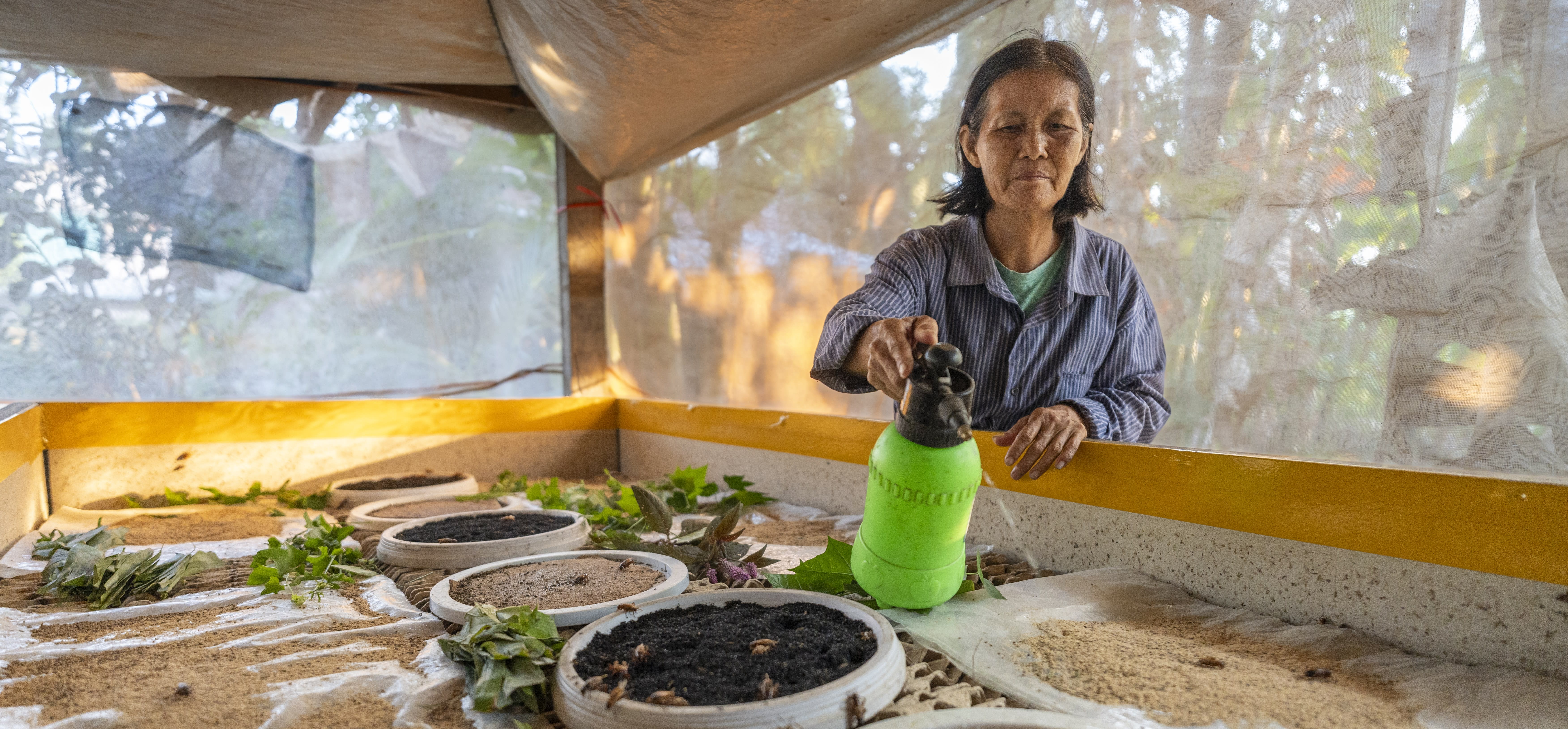
PHOTO: Chek Chob tends to her 40-day-old crickets at dawn, watering lightly and providing fresh pumpkin leaves, rye bran, and chicken feed.
While her husband, Oeur Tho, provides support and assistance, Chek takes the lead in day-to-day cricket farming activities and has become a respected figure within her community. Currently on her 3rd harvest, Chek regularly pursues the mentorship of more experienced AGROW cricket farmers, like Chhun Ly.
Chhun Ly: A Mentor
In the neighbouring village of Prek Luong, 53-year-old Chhun Ly has emerged as a model of success in cricket farming. Though her husband, Vann Chanrithy, was initially hesitant, Chhun recognized the potential for additional family income and reassured him that AGROW would support them with a starter kit. Vann's initial hesitation stemmed from a common misconception in rural villages that those who fail at cricket farming will be forced to migrate to Thailand in search of work.
In fact, since receiving her cricket farming inputs from AGROW last year, Chhun’s meticulous farming practices and modern techniques have led her to proven success. From implementing automated watering systems to maintaining stringent hygiene protocols, she has transformed her basins into models of efficiency and productivity. Her success has not only brought financial stability to their household but has also positioned her as a trusted mentor within her community.
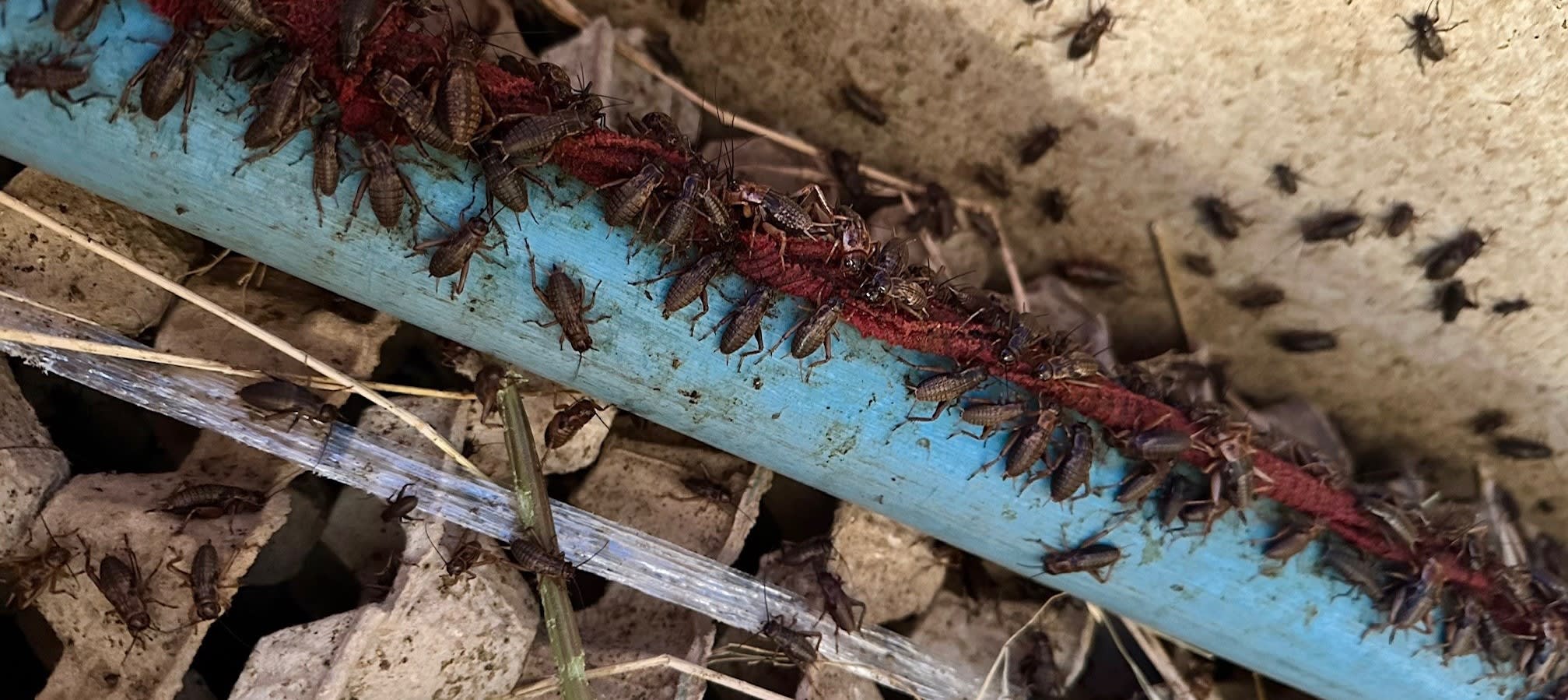
PHOTO: Chhun Ly's inventive watering system allows crickets to drink from a tightly wound (red) scarf, which automatically draws water from a (blue) pipe, ensuring continuous hydration.
"Our success with cricket farming is because we take it very seriously. By having clean basins, knowing how and when to water and feed, regulating temperatures, we have had 4 successful harvests already," Chhun reflects. "Also, I am happy to speak to others in the village when they come to ask me how to have a productive cricket farm. We yield about 18-19kg of crickets for the market each harvest, but others often achieve only 13kg. I want other women to do well too."
Nhin Nika: An Entrepreneur
In Prek Chdor Village, 35-year-old Nhin Nika, mother of three, exemplifies the transformative potential of cricket farming. Equipped with a starter kit from AGROW and a commitment to success, she has established herself as a valuable contributor to her family's financial well-being. Two basins have expanded to 11, and Nhin diligently cycles new cricket eggs into waiting nests before older crickets reach maturity and are harvested.
Though her cricket farm is large, Nhin’s approach is simple and efficient, and she appreciates that cricket farming allows women to do other work at the same time, from childcare to selling duck eggs in the local market. In fact, Nhin’s husband, Sok Sam-ol, happily supports his wife in her cricket farm, and takes on household duties such as cooking and cleaning when she is away at the market. “I want her to be a success, and I want our children to learn about gender equality too,” he says.
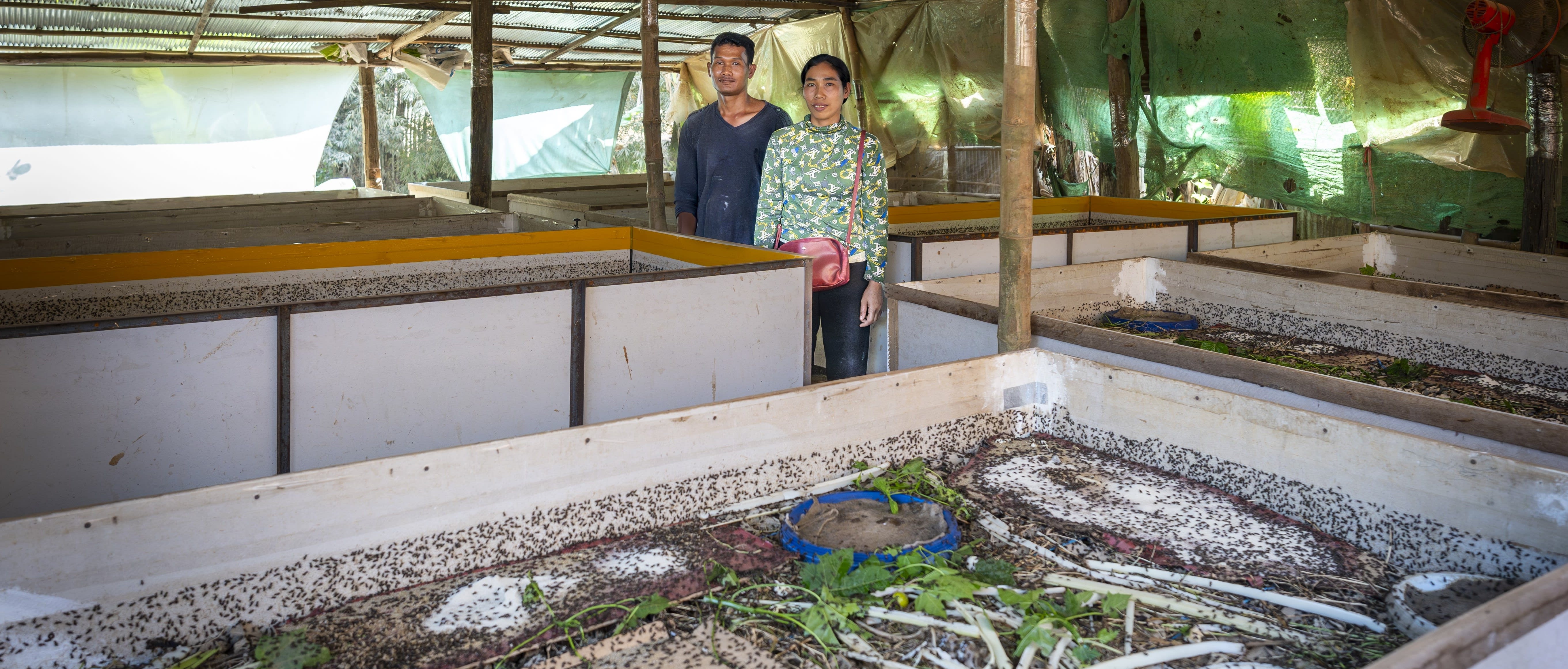
PHOTO: Nhin Nika and her husband, Sok Sam-ol, stand together in their sprawling cricket farm, partners in home and business.
Notably, when selling her crickets, Nhin and Sok have decided together to target markets outside their province, reflecting a strategic understanding of market dynamics and a commitment to maximizing profits. “Some farmers sell crickets in the local markets,” she says, “but my husband and I take the entire batch to a different province and sell to a ‘middleman’ because this brings in more money than selling in small amounts locally. We both want a bright future for our family, and together we can achieve it.”
Fostering Sustainable Livelihoods
The stories of Chek Chob, Chhun Ly, and Nhin Nika illustrate the transformative power of cricket farming in rural Cambodia. Beyond mere sustenance, cricket farming offers women a pathway to economic independence and empowerment – women are breaking free from traditional gender roles, gaining sustainable income, supporting their families, and investing in their children's education. Also, by diversifying agricultural activities, cricket farming enhances resilience to climate change and environmental degradation.
Moreover, the ripple effects of women's involvement in cricket farming extend far beyond individual households. As more women enter the workforce and contribute to the local economy, communities experience a tangible upliftment. Increased income leads to improved access to healthcare, education, and other essential services, laying the foundation for long-term development and prosperity of entire villages and districts.
AGROW is a 3-year program aimed at enhancing the resilience of women and girls in three districts of Cambodia’s Battambang province through animal, human, and environmental health (One Health) initiatives, and is generously funded by Global Affairs Canada. Learn more here.





